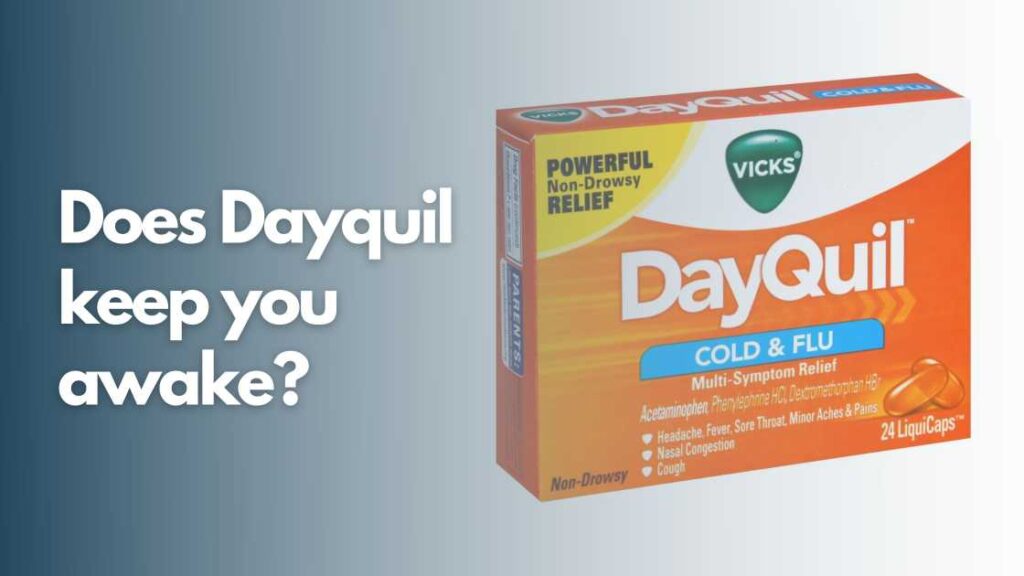Does Dayquil Keep You Awake? Facts & Sleep Guide!
Struggling with a cold and considering Dayquil? The crucial question is: will Dayquil keep you awake at night? The simple answer, for most people, is no. Dayquil is formulated to provide daytime relief from cold and flu symptoms without the stimulating ingredients that can interfere with sleep.
But delving deeper into Dayquil's composition and its potential impact on your sleep cycle reveals a more nuanced picture. While Dayquil doesn't typically contain caffeine or other stimulants, individual reactions to its ingredients can vary. Understanding these components and how they might affect your ability to fall and stay asleep is key to using Dayquil effectively.
| Medication Information | Details |
|---|---|
| Name | Dayquil |
| Type | Over-the-counter cold and flu relief medication |
| Primary Use | Relief of daytime cold and flu symptoms (cough, congestion, fever, aches) |
| Active Ingredients | Acetaminophen (pain reliever/fever reducer), Dextromethorphan HBr (cough suppressant), Phenylephrine HCl (nasal decongestant) |
| Stimulants? | Generally does not contain caffeine or other direct stimulants. |
| Potential Sleep Interference | Phenylephrine may cause stimulation in some individuals; symptom rebound (congestion) can disrupt sleep. |
| Official Website | Dayquil Official Website |
At its core, Dayquil is designed to tackle the bothersome symptoms of a cold or flu that can disrupt your day. Congestion, cough, body aches these are the targets of its key ingredients. Unlike its nighttime counterpart, Nyquil, Dayquil avoids including antihistamines, which are known for their sedative effects. This distinction is intentional, allowing you to function during the day without feeling drowsy.
The active ingredients in Dayquil typically include acetaminophen, a pain reliever and fever reducer; dextromethorphan, a cough suppressant; and phenylephrine, a nasal decongestant. Its the phenylephrine that warrants closer attention when considering sleep. While not a stimulant in the same vein as caffeine, phenylephrine works by constricting blood vessels in the nasal passages, helping to alleviate congestion. This vasoconstriction can sometimes lead to a mild increase in blood pressure or heart rate in susceptible individuals, potentially causing a sense of alertness that could interfere with sleep.
However, the effect of phenylephrine on sleep is highly variable. Some people are simply more sensitive to its effects than others. Factors like individual metabolism, overall health, and the presence of other medications can all influence how phenylephrine impacts your sleep. For some, the decongestant action of phenylephrine might actually improve sleep by relieving nasal congestion that would otherwise keep them awake. For others, the subtle stimulating effect could be enough to disrupt their normal sleep patterns.
Another factor to consider is the timing of your Dayquil dose. Taking Dayquil too close to bedtime may increase the likelihood of experiencing sleep disturbances, even if the ingredients themselves aren't inherently stimulating. Allowing several hours between your last dose and bedtime gives your body time to process the medication and minimize any potential impact on your sleep cycle. It's generally recommended to take Dayquil at least four hours before you plan to go to sleep.
Its also crucial to consider that Dayquil only provides temporary relief. As the medication wears off, symptoms like congestion and cough may return, potentially waking you up in the middle of the night. This isn't a direct effect of Dayquil keeping you awake, but rather a consequence of the underlying illness reasserting itself. In such cases, addressing the symptoms directly with a long-acting medication or other remedies might be necessary to ensure a restful night's sleep.
For those who find themselves needing cold and flu relief at night, but are sensitive to the sedative effects of Nyquil, Dayquil might seem like a viable alternative. And in many cases, it can be. However, it's essential to be mindful of the potential for phenylephrine to cause sleep disturbances and to time your dosage accordingly. If you find that Dayquil is indeed interfering with your sleep, despite its lack of direct stimulants, there are other strategies you can try.
One option is to explore non-medication remedies for your symptoms. Nasal saline sprays, humidifiers, and warm showers can all help to relieve congestion without the use of decongestants. Propping yourself up with extra pillows can also help to drain nasal passages and reduce nighttime coughing. These simple measures can often provide significant relief without any risk of sleep disruption.
Another approach is to consider alternative medications that don't contain phenylephrine. Some decongestants, like pseudoephedrine, are considered more effective than phenylephrine, but they are often behind the counter and require a prescription or pharmacist consultation. It's important to discuss the risks and benefits of any medication with your healthcare provider, especially if you have underlying health conditions or are taking other medications.
Dizziness is another potential side effect associated with Dayquil, although it's not directly related to keeping you awake. This dizziness can sometimes be attributed to phenylephrine's effect on blood vessels, particularly when standing up quickly after sitting or lying down. While not a direct cause of insomnia, dizziness can be unsettling and may indirectly contribute to sleep difficulties. If you experience dizziness while taking Dayquil, it's important to be cautious and avoid activities that could be dangerous, such as driving or operating heavy machinery.
It's worth noting that the question of whether "does Dayquil keep you awake?" is a common one, reflecting people's concerns about the impact of cold and flu medications on their sleep. The widespread availability of over-the-counter remedies makes it tempting to self-treat, but it's crucial to be informed about the potential side effects and interactions of any medication you take. Consulting with a healthcare professional or pharmacist is always a good idea, especially if you have questions or concerns about Dayquil or other cold and flu remedies.
Ultimately, the decision of whether to take Dayquil at night depends on your individual circumstances and your sensitivity to its ingredients. While Dayquil is generally considered to be non-stimulating, its effects can vary. By understanding the potential impact of phenylephrine on sleep, timing your dosage carefully, and exploring alternative remedies when necessary, you can make informed choices about how to manage your cold and flu symptoms without sacrificing a good night's rest.
Dayquil does not contain stimulants like caffeine or antihistamines that can cause drowsiness like those found in Nyquil. Dayquil is essentially the alternative you take to prevent the drowsiness symptoms associated with Nyquil.
Dayquil only provides temporary relief. Congestion, cough, and other symptoms returning in the middle of the night can wake you up. During the day, Dayquil reduces irritating symptoms like cough and nasal congestion. Taking Dayquil too close to bedtime may interfere with your ability to fall asleep and stay asleep throughout the night.
To ensure that the medication has enough time to work effectively, it is best to follow the recommended dosage instructions provided on the packaging or consult with a healthcare professional for specific guidance. Dayquil neither makes you awake nor makes you sleepy. Any compounds which may have the drowsiness effects arent included in the formation of Dayquil. Just like that Dayquil doesnt have those ingredients which keep you awake. All three main components of Dayquil dont have these effects.
If you do not like the sedative effect of Nyquil, you could take Dayquil at night instead. Taken every four hours without exceeding 4 doses within 24 hours, you can safely take Dayquil at night. Yes, you can take Dayquil cold and flu at night if you need it, but keep in mind that it contains phenylephrine, which can potentially keep you awake or disrupt your sleep at night. To help prevent this from happening, it's best to take the medication at least 4 hours before going to bed.
Nasal congestion can certainly make it difficult to get a good night's sleep. Worse still, it tends to become more severe at bedtime. Unfortunately, oral nasal decongestants, such a Sudafed (pseudoephedrine) and Sudafed PE (phenylephrine), have stimulating effects for many individuals, and therefore may not be an option for you at bedtime.
Dizziness, or feeling lightheaded, is a common side effect of Dayquil. You may experience it more intensely if you stand up quickly after sitting or lying down. Dizziness may occur because of phenylephrine, one of the active ingredients in Dayquil. Phenylephrine helps relieve nasal congestion (stuffy nose) by narrowing your blood vessels.
Dayquil has been prescribed for you due to a particular ailment you are suffering from, and you are wondering about the side effects of this drug. Again, the answer is no. On the other hand, Nyquil has an antihistamine that can make you feel drowsy. It is important to have professional advice if you should take these.
If you ever find yourself reaching for Dayquil cold and flu to combat those pesky symptoms, only to later discover that it keeps you awake at night, you're not alone! Nyquil helps you go to sleep because it contains antihistamines. Dayquil doesn't help you go to sleep. Dayquil also doesn't help you stay awake.
If you are only using Dayquil cold and flu relief liquid, it can be taken every 4 hours, but do not exceed four doses within 24 hours. If you have taken 4 doses of Dayquil in one day, do not take Nyquil the same day unless recommended by your healthcare provider.
Learn about the ingredients and potential effects of Dayquil on sleep in detail. Dayquil should not keep you awake because it does not contain any stimulating ingredients that can keep you awake. The medication contains acetaminophen and dextromethorphan but not doxylamine, which induces drowsiness. The best time to take Dayquil is during the day when you are awake and active. This allows the medication to work effectively and provide relief from your symptoms. It's recommended to take Dayquil with a full glass of water and to follow the dosage instructions on the packaging.
Forcing yourself to stay awake after taking nighttime meds can and will make you feel miserable.

Does Dayquil Keep You Awake? Know if it makes you sleepy or not

Does DayQuil Keep You Awake At Night If Taken Before Going to Bed

Does Dayquil keep you awake? Wapomu Health & Wellness